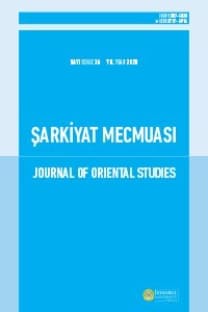Kayıp Gül Romanındaki Mistik Unsurların İncelenmesi
roman, Kayıp Gül, Serdar Özkan, sembolizm, mistik unsurlar
The Analysis of Mystical Elements in 'The Missing Rose' Novel
Novel, The Missing Rose, Sardar Ozkan, symbolism, mystical elements,
___
- اکمپیس، توماس ) 1389 (. اقتدا به مسیح، ترجمۀ سعید عدالت نژاد، تهران: طرح نو
- ادونیس، علی احمد سعید ) 1385 (. تصوف و سوررئالیسم، ترجمۀ حبیبالله عباسی، تهران: سخن.
- ازکان، سردار ) 1389 (. رز گمشده، ترجمۀ بهروز دیجوریان، تهران: آموت.
- استوس، کلودلوی ) 1385 (. اسطوره و معنا، ترجمۀ شهرام خسروی، تهران: مرکز.
- الیاده، میرچا ) 1393 (. مقدس و نامقدس، ترجمۀ نصرالله زنگویی، تهران: سرو
- الیاده، میرچا ) 1394 (. نمادپردازی، امر قدسی و هنر، ترجمۀ محمدکاظم مهاجری، ته ران: پارسه.
- ایزوتسو، توشیهیکو ) 1389 (. صوفیسم و تائوئیسم، ترجمۀ محمدجواد گوهری، تهران: روزنه.
- بیکهام، جک.ام ) 1388 (، صحنه و ساختار در داستان، ترجمۀ پریسا خسروی سامانی، اهواز: رسش.
- پازوکی، شهرام ) 1393 (. عرفان و هنر دورۀ مدرن، تهران: علم. چیتیک، ویلیام ) 1388 (. درآمدی به تصوف، ترجمۀ محمدرضا رجبی، قم: دانشگاه ادیان و مذاهب.
- حافظ، خواجه شمسالدین محمد ) 1372 (. دیوان حافظ، با مقابله از نسخۀ محمد قزوینی و دکت قاسم غنی، تهران: طلوع.
- حدیدی، خلیل ) 1387 (. "سودای سبب سوزی"، دانشکده ادبیات و علوم انسانی تبریز، 1351 ، 204
- حکمت، نصرالله ) 1389 (. حکمت و هنر در عرفان ابنعربی، تهران: متن. حکیمی، محمدرضا ) 1388 (. الهیات الآهی و الهیات بشری)مدخل(، قم: دلیل ما.
- دورانت، ویل ) 1388 (. تاریخ فلسفه، ترجمۀ عباس زریاب، تهران: انتشارات علمی و فرهنگی.
- ستاری، جلال ) 1392 (. مدخلی بر رمزشناسی ع رفانی، تهران: مرکز.
- سجادی، سیدجعفر ) 1393 (. فرهنگ اصطلاحات و تعبیرات عرفانی، تهران: طهوری.
- سیدحسینی، رضا ) 1385 (. مکتبهای ادبی، ج 2 ، تهران: نگاه.
- ISSN: 1307-5020
- Yayın Aralığı: 2
- Başlangıç: 1956
- Yayıncı: İstanbul Üniversitesi Edebiyat Fakültesi Şarkiyat Araştırma Merkezi
'Nahiv' Kavramının Tarihi Arka Planı ve Terimleşme Süreci
Çağdaş Arap Şiirinde Kent Algısı
'Ubeyd-i Zâkânî'nin Sad Pend Risalesi
Kayıp Gül Romanındaki Mistik Unsurların İncelenmesi
Mohammed Hasan HASANZADEH NİRİ, Azadeh ESLAMİ
Çağdaş Farsça Roman Başlıkları Üzerine Bir Bakış
Binbir Gece Masallarında Kadın İmajı
